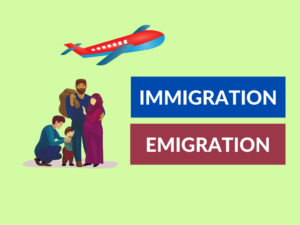What is Immigration?
Immigration refers to the process of individuals moving to a different country with the intention of establishing permanent residence there. It involves crossing national borders and settling in a new country. Immigration can be prompted by various reasons such as seeking better job opportunities, escaping political or social unrest, or joining family members who already reside in the destination country.
Examples of Immigration
1. An individual moving from Mexico to the United States to pursue better job opportunities.
2. A refugee fleeing war-torn Syria and seeking safety in Canada.
3. A student from India enrolling in a university program in Australia.
Uses of Immigration
1. Economic growth: Immigration can contribute to the growth of a country’s economy by bringing in skilled workers who contribute to innovation and productivity.
2. Cultural diversity: Immigrants often bring diverse cultures, traditions, and perspectives, enriching the host society’s cultural fabric.
3. Filling labor gaps: Immigration can help address labor shortages in certain sectors by supplying workers with specific skills that are in demand.
What is Emigration?
Emigration, on the other hand, refers to individuals leaving their home country to establish permanent residence in a different country. It involves moving away from one’s country of origin and settling in a new place. Emigration is usually driven by factors such as economic opportunities, political stability, or social conditions.
Examples of Emigration
1. A software engineer leaving India and moving to the United States for better career prospects.
2. A family relocating from Venezuela to Spain due to political instability.
3. A retiree from the United Kingdom choosing to live in Portugal for a better quality of life.
Uses of Emigration
1. Seeking better opportunities: Emigration can provide individuals with access to better job prospects, higher salaries, and improved living conditions.
2. Escaping unfavorable conditions: People may emigrate to escape political persecution, social unrest, or economic hardships in their home country.
3. Lifestyle choices: Some individuals choose to emigrate to countries that offer a higher standard of living, better healthcare, or a more favorable climate.
Differences Table
| Difference Area | Immigration | Emigration |
|---|---|---|
| Movement Direction | Moving into a new country | Moving out of the home country |
| Causes | Seeking better opportunities, joining family, escaping hardships | Pursuing better opportunities, escaping unfavorable conditions |
| Impact on Home Country | Brain drain, loss of skilled workforce | Reduced pressure on resources, possibility of remittances |
| Impact on Destination Country | Contributions to economy, cultural diversity | Increased diversity, potential economic benefits |
| Legal Regulations | Visa requirements, immigration policies | Emigration restrictions, documentation processes |
| Settlement Intent | Permanent residence | Permanent residence |
| Integration Challenges | Language barriers, cultural adaptation | Language barriers, cultural adaptation |
| Demographic Impact | Population growth, demographic changes | Population decline, changes in home country demographics |
| Economic Impact | Contribution to GDP, tax revenue | Workforce reduction, loss of skills |
| Social Network | Establishing new social connections | Leaving existing social connections |
Conclusion
In conclusion, immigration and emigration are two sides of the same coin, representing movement across international borders. While immigration involves people moving into a new country, emigration refers to individuals leaving their home country. The reasons, impacts, and legal aspects of immigration and emigration can significantly differ, but both play a crucial role in shaping global demographics, cultures, and economies.
People Also Ask
1. What are the main reasons people immigrate?
People immigrate to seek better job opportunities, join family members, escape political or social unrest, or access better living conditions.
2. What are some challenges faced by immigrants?
Immigrants may face language barriers, cultural adaptation difficulties, and legal challenges related to visa requirements and immigration policies.
3. Why do individuals choose to emigrate?
Individuals choose to emigrate to pursue better opportunities, escape unfavorable conditions in their home country, or make lifestyle choices.
4. How does emigration impact the home country?
Emigration can lead to brain drain, where skilled individuals leave the country, resulting in a loss of workforce and potential negative impact on the economy.
5. Are there any legal restrictions on emigration?
Some countries may have restrictions on emigration, requiring individuals to fulfill specific documentation processes or meet certain criteria before leaving the country.




